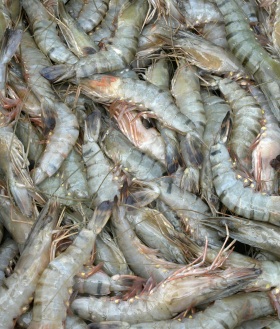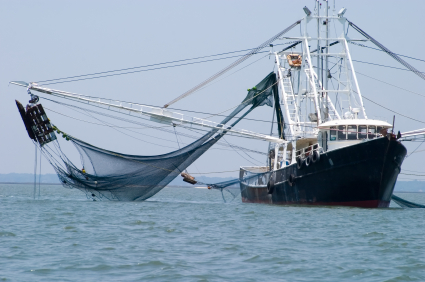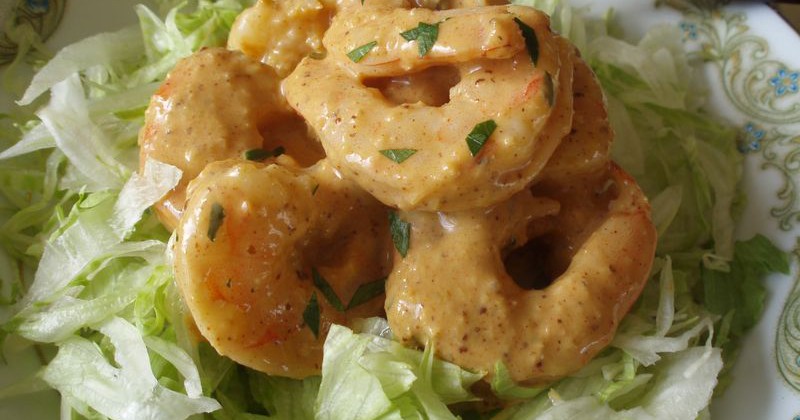An Homage to the Gulf, a Short Elegy for Shrimp and a Recipe for Remoulade


I have spent the last month organizing a fund raising tasting event (LA Helps LA), here in Los Angeles, to benefit the Gulf Restoration Network based in New Orleans. Because it was all over the news this summer, some may think it’s about the BP oil spill. Or perhaps because we have just passed the 5th anniversary of hurricane Katrina, some may think it’s in response to that. While it’s a silver lining to a very dark cloud, that the oil spill brought attention to the Gulf, and while I hope our nation never forgets the destruction wrought by Katrina, it’s not just about the BP oil spill, or Katrina.
In this post, I am going to share with you a few issues, issues that have existed for a very long time, and that I wish everyone understood about the Gulf Coast region, which is the third coast of our nation. Perhaps it'll give you a better sense of why I have poured so much energy into this event. Much of this information came from www.healthygulf.org, which has been in existence since 1995- well before either of the above mentioned occurences. I urge you to visit their site for more info.
The Dead Zone
Sounds scary, right? And it is, although maybe not in the way you’re thinking.
You may have read my relating of this story before. On a summer visit to New Orleans as a young teenager, I accompanied my Uncle JuJune and Aunt Leticia on a trip to “make” the groceries, as they say down there. I marveled at the low price of shrimp in the local grocery stores (a premonition of my life as a chef, perhaps). Uncle JuJune responded “hell, they’ll just give ‘em away if you drive a pick up truck down to the Gulf, they got so much of it.” Unfortunately, they are not quite so plentiful now. I was so saddened to learn what has happened, in the course of my adult lifetime, to shrimp in the Gulf.
A “dead zone” (an area where oxygen levels in the water are too low to support life) forms seasonally off the coast of Louisiana and Texas, which while varying in size from year to year, often reaches the size of states like Delaware and New Jersey. Those fish, crabs, and shrimp that can swim away from the Dead Zone do so, while others simply die. So what causes the causes the Dead Zone ? It’s no mystery.
According to www.heathygulf.org, “when the Mississippi River reaches the Gulf of Mexico, it is loaded with nitrogen and phosphorus pollution. The polluted water acts as a fertilizer of algae, resulting in large algal blooms. When the algae die, they sink to the saltier water below and decompose, depleting already low oxygen in the deeper water. Because the salty bottom waters do not mix well with the lighter, fresh water from the Mississippi River, oxygen in the water is not replenished, resulting in a large dead zone in bottom waters.
There has been an almost threefold increase in nitrogen entering the Gulf from the Mississippi River and its tributaries in the last 30 years. Nitrogen remains the prime factor in causing the Dead Zone. The largest source of nitrogen is commercial fertilizer used throughout the Mississippi River basin – one of the agricultural centers of the United States. Other sources include animal waste, sewage treatment plants, and nitrogen in the atmosphere from fossil fuel combustion.”
Basically all that commodity corn we're growing need a lot of feritlizing, all the chemical companies manufacturing that fertilizer needs a market. And all the runoff from that heavy fertilization goes down the Mississippi River and emptie sinto the Gulf.
In addition to the region’s famous shellfish, some of the other Gulf species most at risk include Red Snapper, Grouper, Greater Amberjack Gray, Triggerfish, Sharks, Menhaden, and Sea Turtles.
The Wetlands
It’s been estimated that Louisiana’s wetlands are being lost at the rate of approximately one football field every 38 minutes. So what’s so important about wetlands, and what does that have to do with the Gulf?
Coastal wetlands are extremely important to the majority of the Gulf's fish species. The loss of coastal wetlands has increased vulnerability to hurricanes and floods for coastal communities. Additionally, wetlands can decrease flooding, remove pollutants from water, and recharge groundwater.
The loss of wetlands affects not only the human population, as we saw so tragically whne hurricane Katrina hit the Gulf Coast, but coastal vegetation is critical, as coastal plants provide needed shelter for young fish in the Gulf's estuaries.
Over 50 percent of the Gulf region's wetlands (which make up almost half of all wetlands in the United States) have been lost since 1790. Furthermore, the Gulf ranked as one of the worst regions in the country for coastal water pollution and toxicity in a recent Environmental Protection Agency report.
The Port
Why we should care? Well, if the protection of wetlands and, consequently, sea life, as well as one of America’s most beloved cities isn’t enough, how about this? The Gulf Coast is home to one of the nation’s most important ports (at New Orleans), along with its system of canals, supplying three trillion dollars annually to the U.S. economy. The coast is a gateway for products like coffee, grain, seafood, and oil and gas. Without this vital port of entry from the Caribbean and Central and South America, many of these items would cost us, the average American, much more than they do now.
Of course, it's not all about doom and gloom-we want to have fun at our event, too, so I’ll tempt you just a bit with some of the food and drink we'll be serving there. Greg of sippitysup.com will be serving Moroccan Salmon Bites. Amir of DuoDishes.com will be serving a Pumpkin Mascarpone Crostini with Caramelized Onions, Persimmon and Stilton Cheese, and Rashmi of yumkid.com will be serving Chicken Tandoori Skewers. Oh, and The Sazerac Company has sent some of their Sazerac Rye Whiskey, Peychaud Bitters and Herbsaint to make one of America's oldest and greatest cocktails.
Next post, we’ll have a guest writer and registered dietitian, Monika Woolsey. Monika has been passionate about the health of our oceans for a long time, and will talk about the importance of healthy oceans to our health as human beings, with several suggestions for fish to eat now, and fish to avoid.
In the meantime, please continue to the next page for the recipe for a classic New Orleans shrimp dish, a dish you’ll often see served not only in homes there, but on many restaurant menus, too….






